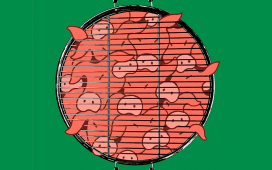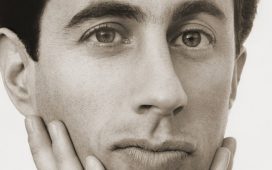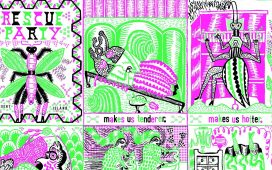“In cooking, as in writing, you must please yourself to please others,” Nigella Lawson wrote, in her first book, “How to Eat,” from 1998. In the course of eleven subsequent books (and more or less the same number of television series), she has rarely strayed from this gastronomic axiom. To please oneself requires confidence, which in turn requires knowledge—emotional, intellectual, sensual. Lawson’s most recent book, “Cook, Eat, Repeat,” was written almost entirely during London’s coronavirus lockdown, during a four-month period that she spent in near-total solitude. Its essays and recipes take a more intimate—and, consequently, more expansive—approach to the nature of pleasure. Lawson devotes one chapter to the unglamorous anchovy. Another is titled “A Loving Defense of Brown Food.”
In England, where Lawson lives, she is a titanic figure—the Guardian columnist Hadley Freeman recently noted that, after Princess Diana, she is Britain’s only no-surname-required public figure. This status is a consequence not only of her success as a writer and television star but also of the tabloid frenzy surrounding the end, in 2013, of her second marriage, to the billionaire Charles Saatchi. It can be striking to compare the Lawson of the broadsides—a posh, exquisite cypher, sorrowful and sharp-edged—with the affable, idiosyncratic person who began her career as a journalist and maintains an aversion to the trappings of fame. I spoke to Lawson last week, over Zoom, as she sat on a sofa adjacent to her kitchen. Her son’s cat, whom she has been caring for during the pandemic (and who is named Cat), slinked in and out of frame. During our conversation, which has been edited for length and clarity, we talked about performance and privacy, breaking the rules of her own recipes, and the fiction of the food-magazine dinner party.
Do you think there’s something particularly intimate about cookery writing, and putting that sort of writing out into the world?
I think there both is and isn’t. I feel that writing about food allows one to be utterly honest, and personal, and in no way guarded. But, in some sense, it’s a metaphor for the personal, rather than being actually personal. It’s not revelatory, I would say. It’s personal without being confessional. That’s the kind of personal that I feel more comfortable with.
There’s such a desire, I think, on the part of readers and maybe publishers, to want the confessional—the deep, “I’m pouring out my viscera on the page” kind of piece, and then here’s the recipe as punctuation at the end.
I don’t know that I feel pushed toward that, except perhaps when it comes to that curious thing—more in this country than in yours—whereby you’re put on trial for having written a book, and you’re asked to defend the book in all manner of ways. Things are always thought to have some deep meaning to uncover. In a way, I feel I’m quite personal in this new book, about my mother, and other things, but it feels within the context. It doesn’t feel like hideous oversharing, even if it’s indiscreet. It doesn’t feel like Coriolanus is being begged to go into the marketplace to show his wounds.
Is that a degree of personal that you think you would have been capable of with your earlier books?
I don’t feel a great need to talk about every aspect of my life. I remember, in, oh, my fourth book or something, I said in a recipe something like, “You can’t rely on anything, you can’t rely on anything or anyone else in this world, and therefore you have to do it yourself.” It was in the context of a recipe for one, which was some chicken with lardons and lentils. And some reviewer said that the focus on food often hid the fact that I had a rather bleak outlook on life.
On the whole, a book always feels so much more intimate anyway than other forms of discourse. It certainly feels that only those who are wanting to read it will be reading it. Television is slightly different—it can feel very intimate while you’re making television, but you do have to remember that it isn’t just the people in the room who are going to see the program.
But I think long ago, even when I did interviews, I felt that it was possible to be open without being revelatory. You can protect yourself without being dishonest.
In the essay about brown food, you describe how so many of the foods that are exquisite in real life, like stews and braises, just have a total flattening effect in photos, all of their beauty is taken away when they’re put behind a camera lens. It does feel ripe for a metaphor.
Yes. It does, doesn’t it? And that’s right, you see, in the sense that so much of what we prize in life, in people, in food, in our surroundings, is such a mixture of mess and beauty. The polarization that goes on in our world now, in far more sinister ways than this, makes actually talking about things other than in one’s own terms impossible. Because things always have to be good or bad, or be a pithy answer, or a way of soothing other people.
Do you keep that in mind as you write?
The first time I did publicity in the States, I was on some talk show—I don’t know where it was—and someone said to me, “You’ve suffered a lot of loss in your life. What has it taught you?” And I said, “It’s taught me that the universe is random and cruel, or chaotic also.” The panic in this man’s eyes when I said that! Because that’s not an answer he could deal with. I waited for a while, and then I thought, I’ll be kind, so I said, “And it’s taught me to cherish life and be grateful for the good things.” And, oh, the look of relief! He almost sank back in his chair. I feel that often—people ask you questions, but there are only certain answers they want.
Do you mean he couldn’t handle that answer journalistically? Or was it more of an existential thing?
I think it was probably the sort of show to make people feel better and cozy and that sort of thing. So it was probably the wrong thing for me to say, but I also think that there’s such a false view about people who cook. Yeah, people who cook are nurturing, but we’re also controlling. It’s quite interesting that people always read the desire to take pleasure in small things as an optimistic response. Whereas you could say it was the response of a seasoned pessimist. That you grab what you can, and you’re not waiting for the great golden horizon.
It feels like that old line about how the optimist believes this is the best of all possible worlds, and the pessimist is sure that it is.
That’s brilliant. I love that.
I was thinking earlier that you can play a similar trick with the title of your new book—“Cook, Eat, Repeat”—where, depending on how you approach it, it can read as an invitation or a threat.
On the one hand, cooking is largely written about as if it’s just this beauteous thing that comes into the world, and it’s also so often written about as if it’s a hobby. And the hobbyist approach I find odd. Even on days when you don’t want to do it, you have to get dinner on the table. The discipline of having to do it means you’re almost not responsible for making the decision, and that makes it easier. You just do it, and then, as you do it, you feel a bit better.
Do you really have to do it? Even if you don’t go to a restaurant, there’s takeout, grocery stores are all doing prepared food.
I don’t know. I can’t quite see the point in getting food that you could cook yourself. I’m so happy to have just bread and cheese. I think, perhaps, in terms of good stuff relative to income, it’s probably a bit less expensive in New York than it is here. But, in a sense, you can’t get takeout forever. I would feel, after a while, a bit shortchanged if I were simply the consumer.
I like that distinction—there is an art to consumption, which is its own thing. But creating it is a very different act.
It is very different, and you need both. In the past year that we’ve been under lockdown, I’ve cooked mainly just for myself—I’m sure friends of mine who’ve had to cook for their family of four, day in and day out over the last year, feel very differently about it—I’ve never cooked just for myself for so long. I have enjoyed it immensely. In the same way, I feel I’ve been shown a troubling, relatively new tendency in myself to be alone for so long without being lonely.
Would you have suspected that you would enjoy being alone for so long?
No, I never used to like solitude much. I went a bit too inward. It must be an age thing—over the past three years, I have found I have grown not just to enjoy solitude but to need it. Like many things, once you get used to it, it becomes very necessary. It doesn’t follow that I would have enjoyed it when it was quite so unremitting, but I did. I do.








